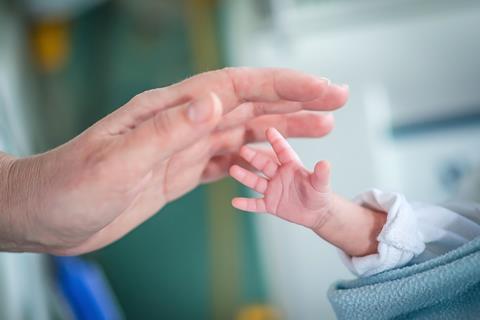Research into preterm children’s long-term development and learning could inform strategies for teachers to support their progress

Children born before 34 weeks gestation are more likely to have poorer reading and maths skills than those born at full term, although not every child born prematurely will experience learning or developmental challenges. As medical science advances and more babies survive premature birth, an average primary class will include two preterm children. What does this mean for secondary school teachers, and science teachers, in particular?
David Odd, a neonatal consultant at Southmead Hospital, Bristol, has studied the impact of premature birth on school performance. He recently reported that preterm children have a higher risk of needing special educational support and achieving low GCSE scores than those born at full term, although the impact of prematurity appears to diminish the longer children are at school. He also found that infants born before 32 weeks gestation have the highest risk of poor school outcomes.
What’s more, school entry dates are based on children’s actual birthdates rather than their due dates, which appears to have a measurable impact on preterm students’ exam results in adolescence. David reports that, consequently, this may ‘limit adulthood opportunities’. There is evidence that placing a preterm child in the ‘correct’ school year reduces the possibility of special educational needs (SEN).
‘[The education system] is only just starting to consider the best ways to support these ex-preterm infants as they grow,’ David comments. ‘Preterm birth is common and most teachers will have ex-preterm infants in their classrooms. Training may be useful, but recognition of this group of vulnerable infants is certainly important. Recognising their “true age” and that they have higher risk of additional needs would perhaps be the first step.’ David strongly supports flexibility on school admission age for this group, as his results suggest that this may lead to improved late educational outcomes, particularly for those born extremely preterm.
Struggles with maths and science
Preterm children experience particular difficulties with working memory and hand-eye coordination (visuospatial awareness), according to research by Samantha Johnson, a developmental psychologist at the University of Leicester, and Camilla Gilmore, who studies mathematical cognition at the University of Loughborough. This could be why some preterm children find maths challenging at primary level, as reported by the Premature Infants’ Skills in Mathematics (PRISM) study.
Samantha and her colleagues are currently researching mathematics attainment in secondary school (PRISM-2). Early evidence shows that preterm students are still at higher risk of lower attainment than their term-born peers. In particular, they found that students born very preterm tend to struggle more with many aspects of maths, including basic number skills, arithmetic and algebra. ‘Given the close relationship between science and mathematics, it’s likely that science education might also be an area of difficulty,’ Camilla adds.
- A preterm birth occurs before 37 completed weeks of pregnancy.
- Each year around 60,000 babies are born preterm in the UK (7% of all births).
- Of these: 5% are born before 28 weeks (extremely preterm); 11% at 28–32 weeks (very preterm); and 85% at 32–37 weeks (moderate to late preterm).
Source: tommys.org
The team found that the attainment of very preterm children showed little change from primary to secondary school compared with their peers. ‘Although very preterm children don’t seem to catch up with their peers by secondary school, they also don’t seem to fall further behind,’ says Camilla.
Samantha and Camilla believe that students born very preterm who struggle with maths may need different types of support compared with other students who have difficulties. ‘They may benefit from particular strategies that reduce the working memory demands of classroom activities, or extra support with visuospatial skills,’ Camilla says. ‘For example, science subjects may have particularly high visuospatial demands, such as reading information from graphs, drawing diagrams or carrying out practicals, and some preterm children may struggle with this.’
How useful is labelling?
Disclosing preterm birth status would help to identify those who could benefit from more support, says Jenny Retzler, a developmental psychologist at the University of Huddersfield. Jenny explains there is evidence that preterm children with attention problems don’t always receive the SEN support they require. ‘This is thought to partly be down to the fact that these symptoms tend to be tricky to observe,’ Jenny comments. ‘For example, they have difficulty paying attention, or with school work, rather than disruptive behaviour.’
Jenny points to research suggesting that the majority of teachers and educational psychologists think disclosing preterm birth status could be helpful. ‘Few felt it would cause any negative effects due to labelling,’ she notes.

Jane Essex, a chemistry education lecturer at the University of Strathclyde, disagrees. ‘[Identification] has no meaningful predictive capacity, and provides no guidance on how education should be conducted,’ she says. Jane thinks teachers should only use functional labels to guide practice. Prematurity might be only one reason for slower processing ability. She believes that making adjustments to help a child learn shouldn’t depend on cause but rather their functional significance in learning. ‘So slow processing speeds mean that lists or instructions need to be short, repeated and supported with icons, signs and writing to make them more memorable.’
Rob Butler, a special school science teacher for 20 years, also has reservations. ‘A diagnosis is really only useful to the school if it provides a set of strategies to help the child. There is also a danger that it sets parents up to expect provision that they might not receive, especially within a stretched mainstream school.’
However, many teachers report that they don’t know enough about the difficulties preterm children may face and lack confidence in supporting them, says Samantha. Her team is working with teachers, educational psychologists, parents and young adults born preterm to design an online training resource for teachers. This resource provides information about preterm birth and how it can affect long-term development and learning as well as strategies for teachers to support learning. A recent evaluation of this resource found that teachers’ knowledge and confidence increased after use, Camilla reports. The great news is that this training material will be freely available for teachers ‘very soon’.









No comments yet